动词时态语态虚拟语气主谓一致
【高考英语一轮复习】第一讲 谓语动词的时态、语态和主谓一致
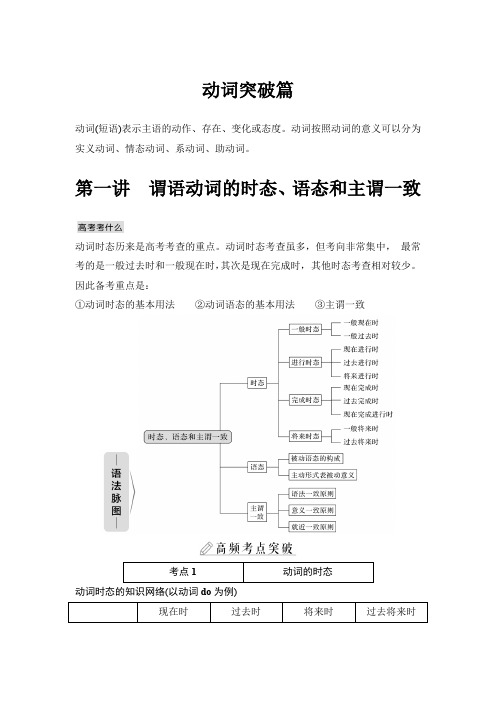
动词突破篇动词(短语)表示主语的动作、存在、变化或态度。
动词按照动词的意义可以分为实义动词、情态动词、系动词、助动词。
第一讲谓语动词的时态、语态和主谓一致动词时态历来是高考考查的重点。
动词时态考查虽多,但考向非常集中,最常考的是一般过去时和一般现在时,其次是现在完成时,其他时态考查相对较少。
因此备考重点是:①动词时态的基本用法②动词语态的基本用法③主谓一致动词时态的知识网络(以动词do为例)1.一般时态(1)一般现在时①表示经常或习惯性的动作,多用动作动词,且常与表频率的时间状语连用。
We have meals three times a day.我们一日吃三餐。
②表示客观真理、科学事实及自然现象。
The sun sets in the west.太阳从西方落下。
③在时间、条件状语从句中常用一般现在时代替一般将来时。
I’ll write to her when I have time.有时间我会写信给她。
(2)一般过去时①表示过去发生的一次性或习惯性动作或状态。
We often played basketball together.我们(过去)经常在一起打篮球。
②时间、条件、让步状语从句中,若主句用了过去将来时,从句常用一般过去时。
He said he would tell her the news as soon as he met her.他说他一见到她就把这个消息告诉她。
单句语法填空①The 80,000 objects collected by Sir Hans Sloane, for example, formed (form) the core collection of the British Museum which/that opened in 1759.(2020·新高考卷Ⅰ语法填空)②The unmanned Chang’e-4 probe (探测器)—the name was inspired by an ancient Chinese moon goddess—touched (touch) down last week in the South Pole-Aitken basin.(2020·全国卷Ⅰ语法填空)③When/As he asked the villagers on the banks of the river where he could find the legendary (传奇的) artist, they smiled and pointed (point) down the river.(2020·全国卷Ⅲ语法填空)④New methods meant__(mean)that fewer people worked in farming.(2020·浙江卷语法填空)⑤While running regularly can’t make you live forever,the review says it is(be) more effective at lengthening life than walking,cycling or swimming.(2018·全国卷Ⅰ语法填空)⑥Sarah says,“My dad thinks I should take the offer now.But at the moment,school comes (come) first.I don’t want to get too absorbed in modeling.”(全国卷Ⅲ语法填空)2.进行时态(1)现在进行时(am/is/are+现在分词)①表示说话时正在进行或发生的动作,也可表示现阶段正在进行的动作或存在的状态。
高考英语二轮总复习 核心语法必备 专题一 谓语动词(动词的时态、语态、主谓一致、情态动词和虚拟语气)

cook, draw等, 常与well, easily,
这件衬衫不好洗。
smoothly等副词连用
open, close, lock, move, keep等动词常 The drawer won't lock.
与won't, can't, wouldn't 连用
这个抽屉锁不上。
重点一
重点二
重点三
重点四
意义 集体名词class, family, army, team, club, company, population, 单
一致 enemy, party, crew, audience, committee, government, majority, 复
原则 group等强调整体时谓语动词用单数, 指个体成员时谓语动词用 数
代词
单个的动词-ing形式、动词不定式或主语从句
重点一
重点二
重点三
重点四
原则
主语
谓语
由and连接的两个并列成分表示两个不同的概念
有生命的集体名词, 如people, police, cattle等 一些常用作复数或只有复数形式的名词, 如goods,
stairs,
arms等
复数
山脉、群岛、瀑布等以-s结尾的专有名词
重点三 主谓一致3原则
原则
主语
谓语
语法 单数
单数
一致 原则
复数
复数
就近 一致 原则
由or, either... or..., neither... nor...,
not only... but (also)..., not... but... 等连接
与最近的主语在单复数上 保持一致
李辉老师语法主谓一致

讲义·主谓一致谓语动词三要素:主被动、时态、主谓一致(虚拟语气、情态动词)主语和谓语动词在单、复数形式上的一致,就是主谓一致。
也就是,如果名词中心词是单数,动词用单数形式;如果名词中心词是复数,动词用复数形式。
My family _is_ (be) a big one.My family _are_ (be) watching TV.family = 整体(一个家)= 单数family = 家庭里所有的成员= 复数【壹】语法形式一致原则一、主语中心词后面有表示“增、减、补充说明”的词组时,主谓一致仍看中心词表示增加的:as well as, with, along with, together with, in addition to, accompanied by, besides, plus等along with 和in addition to 除此之外(包含前面的内容)besides 除此之外(包含前面的内容)accompanied by 跟随着……plus 加上,还有The man (together with his wife and children) sits on the sofa watching TV.那个人和他妻儿老小坐在沙发上看电视。
The man, his wife and their children sit on the sofa watching TV.and是并列连词表示减去的:except, but(除去)等All the students (except Tom) have been to America.除汤姆外,其他学生都去过美国。
I want nobody but you.表示补充说明的:including, rather than, like(像), such as等The text book, plus its reference books, is well designed.这本教材,还有参考书,设计的都很好。
动词的时态、语态和主谓一致(图)
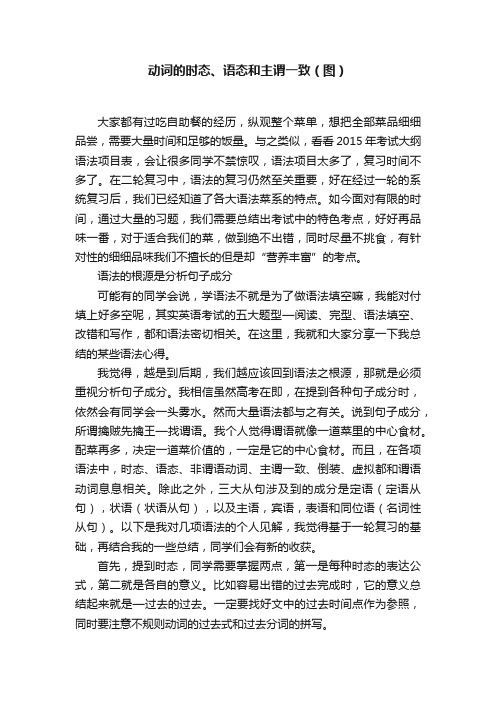
动词的时态、语态和主谓一致(图)大家都有过吃自助餐的经历,纵观整个菜单,想把全部菜品细细品尝,需要大量时间和足够的饭量。
与之类似,看看2015年考试大纲语法项目表,会让很多同学不禁惊叹,语法项目太多了,复习时间不多了。
在二轮复习中,语法的复习仍然至关重要,好在经过一轮的系统复习后,我们已经知道了各大语法菜系的特点。
如今面对有限的时间,通过大量的习题,我们需要总结出考试中的特色考点,好好再品味一番,对于适合我们的菜,做到绝不出错,同时尽量不挑食,有针对性的细细品味我们不擅长的但是却“营养丰富”的考点。
语法的根源是分析句子成分可能有的同学会说,学语法不就是为了做语法填空嘛,我能对付填上好多空呢,其实英语考试的五大题型—阅读、完型、语法填空、改错和写作,都和语法密切相关。
在这里,我就和大家分享一下我总结的某些语法心得。
我觉得,越是到后期,我们越应该回到语法之根源,那就是必须重视分析句子成分。
我相信虽然高考在即,在提到各种句子成分时,依然会有同学会一头雾水。
然而大量语法都与之有关。
说到句子成分,所谓擒贼先擒王—找谓语。
我个人觉得谓语就像一道菜里的中心食材。
配菜再多,决定一道菜价值的,一定是它的中心食材。
而且,在各项语法中,时态、语态、非谓语动词、主谓一致、倒装、虚拟都和谓语动词息息相关。
除此之外,三大从句涉及到的成分是定语(定语从句),状语(状语从句),以及主语,宾语,表语和同位语(名词性从句)。
以下是我对几项语法的个人见解,我觉得基于一轮复习的基础,再结合我的一些总结,同学们会有新的收获。
首先,提到时态,同学需要掌握两点,第一是每种时态的表达公式,第二就是各自的意义。
比如容易出错的过去完成时,它的意义总结起来就是—过去的过去。
一定要找好文中的过去时间点作为参照,同时要注意不规则动词的过去式和过去分词的拼写。
接下来是主谓一致,这项语法太过繁杂,情况有很多种,背起来特别麻烦还容易记混,我就编了两句话供大家参考。
统考冲刺语法第一讲动词forteacher
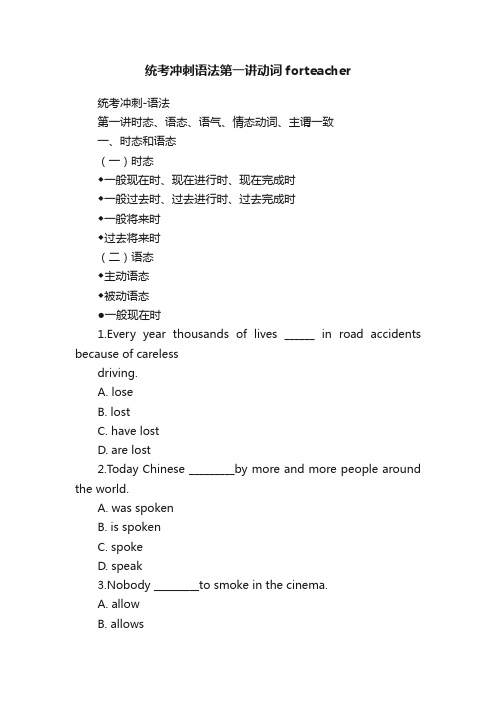
统考冲刺语法第一讲动词forteacher统考冲刺-语法第一讲时态、语态、语气、情态动词、主谓一致一、时态和语态(一)时态◆一般现在时、现在进行时、现在完成时◆一般过去时、过去进行时、过去完成时◆一般将来时◆过去将来时(二)语态◆主动语态◆被动语态●一般现在时1.Every year thousands of lives ______ in road accidents because of carelessdriving.A. loseB. lostC. have lostD. are lost2.Today Chinese _________by more and more people around the world.A. was spokenB. is spokenC. spokeD. speak3.Nobody _________to smoke in the cinema.A. allowB. allowsC. is allowedD. are allowed4."Town Hall is the tallest building in the city." "_______ from here?"A. Can it seeB. Can it be seenC. Can be seeingD. Can see5.-Take this medicine twice a day, Peter? -Do I have to take it? It ________ soterrible.A. is tastingB. is tastedC. tastesD. has tasted6.The earth ______ round the sun.A. is movingB. movesC. movedD. has moved●现在进行时7.Selecting a mobile phone for personal use is no easy task because technology_______so rapidly.A. is changingB. has been changedC. will have changedD. will change●现在完成时8.She _______ 100 pages of the book today.A. has already readB. already readsC. already readD. was already read9.The young _______ eaten up almost everything on the table.A. isB. areC. hasD. have10.--Where is Mr.Green? --______the library.A. He's gone toB. He's been toC. He isn't inD. He's out11.I ______ to Shanghai once.A. wentB. have beenC. have goneD. was12.John's father ______ mathematics in this school ever since he graduated fromHarvard University.A. taughtB. teachesC. has taughtD. is teaching13.They ______each other for more than twenty years.A. don't seeB. didn't seeC. haven't seen14.-----Nice to see you. I ______you for a long time.A. haven't seenB. didn't seeC. hadn't seenD. don't see●一般过去时15.He ______ to me last week.A. is writingB. writesC. wroteD. is written16.At that time, she ______ on a journey with her friend.A. isB. wasC. has beenD. is being17.A long time ago, I _______ in London for three years.A. had livedB. have livedC. livedD. have been living答案.C18.Everyone of them _______ tired and wanted a good rest.A. seemsB. is seemedC. was seemed答案:D19.It ________that they had no idea at the moment.A. seemedC. is seemingD. is seemed答案:A20.Unfortunately, his father ________ in the traffic accident yesterday.A. deadB. was killedC. killedD. was dead答案:B21.James Watt ______ the steam engine.A. was inventingB. inventedC. had inventedD. has invented答案.B22.- Nancy was badly injured in the accident yesterday and she was sent tohospital.- Oh, really? I_________. I ________ visit her.A. didn't know; will go toB. don't know; will go toC. didn't know; am going toD. haven't known; am going to答案.A23.Tom was watching TV when someone______.A. comesB. comeC. cameD. has come答案.C24.The garden _______while the Greens were away from home.A. took good care ofB. was taken good careC. was taken good care ofD. was taking good care答案:C25.My uncle ______ until he was 45.A. marriedB. didn’t marryC. has marriedD. would marry●过去进行时26.When Lily came home at 5 p.m. yesterday, her mother _______ dinner in thekitchen.A. cookedB. was cookingC. cooksD. has cooked答案.B27.I fell and hurt myself while I ________ basketball yesterday.A. was playingB. am playingC. playD. played28.I ______ my homework this time yesterday evening.A:were doing B:was to doC:am doing D:was doing答案:D过去完成时29.I was giving a talk to a large group of people, the same talk I __________tohalf a dozen other groups.A. was givingB. am givingC. had givenD. have given答案.C30.Until then, his family ______ from him for six months.A. didn’t hearB. hasn’t heardC. hasn’t been hearingD. hadn’t heard一般将来时31.When the railway is completed, we ____ get to town much easily.A. canB. couldC. are able toD. will be able to答案.D32.You ____ buy some reference books when you go to college.A. mustB. will have toC. must toD. have to答案.B33.- Nancy was badly injured in the accident yesterday and she was sent tohospital.- Oh, really? I_________. I ________ visit her.A. didn't know; will go toB. don't know; will go toC. didn't know; am going toD. haven't known; am going to答案.A34.There's no food in the fridge. They _______shopping.A. goB. are goC. are goingD. are going to go答案:C35.There _______a basketball match this afternoon.A. is going to beB. is going to haveC. is going to isD. is going to has答案:A36.If Mary _______shopping this afternoon, please ask her to write a shopping listfirst.A. will goB. goesC. wentD. has gone答案:B37.We'll hold a sports meeting if it _____rain tomorrow.A. won'tB. isn'tC. doesn'tD. has答案.C38.If it ______tomorrow, we will not go out.A:rains B:will rain C:is to rain D:is going to rain 答案:A39.I'll give you a ring if Mike ________ tomorrow.A:comes B:will come C:came D:is coming答案:A40.These desks and chairs ______to the children in the mountain villages nextweek.A. are sentB. will sendC. have sentD. will be sent答案:D41.It's reported that a new hospital _____________here next year.A. would be set upB. was going to set upC. will be set upD. is going to set up●将来完成时42.I ______ writing the article by the time you get back.A. shall finishB. must have finishedC. have finishedD. shall have finished●过去将来时43.- Don't you feel surprised to see George at the meeting?- Yes. I really didn't think he ____ here.A. has beenB. had beenC. would beD. would have been答案.C44.We were all surprised when he made it clear that he _____________officesoon.A. leavesB. would leaveC. leftD. had left答案:B●被动语态45.The grey building is where the workers live, and the white one is where thespare parts ______ .A. are producingB. are producedC. producedD. being produced46.The fifth generation computers, with artificial intelligence, ______ andperfected now.A. developedB. are being developedC. have developedD. will have been developed二、情态动词◆must◆ought to, should◆may◆can◆will◆need●must 1)必须2)肯定推测must do sth, must have done sth47.When the lights turn red, the traffic ________ stop.A:can B:may C:must D:needn't48.The young lady coming over to us _____ our English teacher; the way shewalks tells us that!A. must beB. can beC. would beD. could be49.My wallet is nowhere to be found. I ____ in the store.A. must drop itB. must have dropped itC. should have dropped itD. ought to have dropped it●ought to, should1)应该ought to do sth, should do sth; ought to have done sth, should have done sth50.He didn't pass the final examination. He _______ it.A. must have prepared forB. ought to prepare forC. ought to have prepared forD. should prepare for答案.C●may1)可以May I use your pencil? 2)也许may do sth, may have done sth51.--____I put my coat here? --Sorry, you ______.A. May; mustn'tB. Do; don'tC. can; needn'tD. May; can't52.I cannot find my watch in the room. It ____ by somebody.A. must have takenB. may have takenC. may have been takenD. should have been taken●can1)可以2)表示惊讶3)否定推测can not have done sth 53.How ______ you say that you really understand the whole story if you havecovered only part of the article?A. canB. mustC. needD. may答案.A●will1)表示意愿54.– Write to me when you get home. –- OK, I _______.A. mustB. should C will D. can●need 1)需要need (needn’t) do sth55.You _____do that, if you don't want to.A. won'tB. mustn'tC. needn'tD. shouldn't56.You______to the meeting this afternoon if you have something important todo.A. needn't to comeB. don't need comeC. don't need comingD. needn't come57.– Must I finish the work right now? – No, you _____. You can do it tomorrow.A. needn’tB. shouldn’tC. mustn’tD. can’t三、虚拟语气◆主语从句中的虚拟语气◆表语从句中的虚拟语气◆宾语从句中的虚拟语气◆定语从句中的虚拟语气◆状语从句中的虚拟语气◆表示条件的从句和表示结果的主句中的虚拟语气◆If only条件句中虚拟语气●宾语从句中的虚拟语气58.The dean of the Philosophy Department requested thatthe visiting scholar____a lecture on Sartre.A. gaveB. giveC. would giveD. had given答案.B59.The doctor suggested that the patient ____ in hospital for another week.A. stayedB. stayingC. stayD. to stay答案:C60.The doctor advised that Mr. White ______ an operation at once.A. hadB. would haveC. haveD. was going to have61.I ______ I were a birdA. hopeB. wishC. expectD. imagine62.Peter wishes that he ______ law instead of medicine when he was in college.A. could studyB. studiedC. had studiedD. would study63.I didn’t go to the cinema the day before yesterday, but I do wish I ______ there.A. wereB. would beC. had beenD. will be64.I wish everybody ______the meeting tomorrow.A. will attendB. would attendC. had attendedD. is going to attend65.I would rather _______ two weeks earlier.A. you should come hereB. you come hereC. you must come hereD. you came here答案.D●定语从句中的虚拟语气66.It's time we ____ the lecture because everybody has arrived.A. will startB. shall startC. startD. started67.It’s high time that he settled down in the country and _________ a new life.A. startB. startedC. startingD. to start68.It is high time that we _______ working to take a break.A. should stopB. would stopC. stoppedD. stop69.It is high time we ______something to stop road accidents.A. didB. are doingC. will doD. do●状语从句中的虚拟语气70.He talks as if he ______ everything in the world.A. knowsB. knewC. had knownD. would have known71.The old lady is quarrelling as if she ______ mad.A. wasB. isC. areD. were●表示条件的从句和表示结果的主句中的虚拟语气72.If you had come five minutes earlier, you _____ the train to Birmingham. Butnow you missed it.A. would catchB. would have caughtC. could catchD. should catch答案.B73.Had you come five minutes earlier, you _____ the train to Birmingham. Butnow you missed it.A. would catchB. would have caughtC. could catchD. should catch答案.B74.If the doctor had been available, the child ____________.A. would not dieB. could not have diedC. might not dieD. should not have died答案:B75.Had he worked harder, he ______ the exams.A. must have got throughB. would have got throughC. would get throughD. could get through●主语从句中的虚拟语气76.It is desirable that the airplane ______ as light as possible.A. isB. wereC. beD. had been●表语从句中的虚拟语气77.The doctor’s suggestion was that the patient ______ at once.A. to be operated onB. being operated onC. be operated onD. operate on●If only 条件句中的虚拟语气78.If only she _______ the opportunity to go to university in those years.A. hasB. has hadC. will haveD. had had四、主谓一致◆不可数名词作主语,谓语动词一般用单数。
2020届二轮复习 动词的时态、语态、主谓一致和虚拟语气 课件

(be)both widely reviewed and highly praised, strengthened Dickens' status as a leading novelist.
was being followed (follow). 13.(2017·高考江苏卷改编)He's been informed that he doesn't qualify (not
qualify) for the scholarship because of his academic background. 14.(2017·高考全国新课标卷Ⅱ)Truly elegant chopsticks might be made (make) of
2.通过思考时间标志词、主被动关系、是否符合事实、主语单复数、固定句型 来确定谓语动词的形式。 (1)通过时间标志词语定时态。不同的时间表示动作发生时间点或时间段不同,谓 语动词要用不同的形式,即时态。近几年高考主要考查谓语动词的一般现在时、 一般过去时、一般将来时、现在完成时、过去完成时、现在进行时、过去进行时 等,很少涉及将来进行时、将来完成时、过去将来时。抓住时间标志词语,是确 定谓语动词形式的关键。常见的时态标志词有:
非谓语 动词
2 3 2
并列连 词/复 合句及 其他
1
1
1
命题趋势: ①由对语法知识的考核到对语法技能的考核的转变; ②在语境中全面考查语法知识,借助多种考查方式,把对考生的要求由“一知半 解”提高到自然地、自发地运用语法知识去表达的水平。
统考冲刺 语法 第一讲 动词for teacher
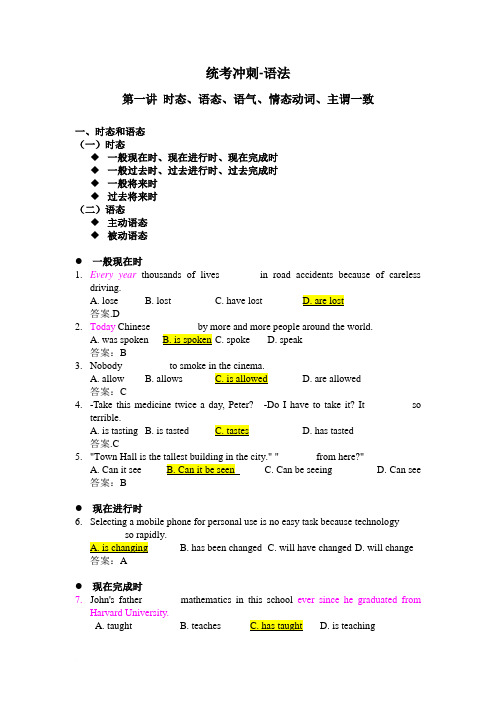
统考冲刺-语法第一讲时态、语态、语气、情态动词、主谓一致一、时态和语态(一)时态◆一般现在时、现在进行时、现在完成时◆一般过去时、过去进行时、过去完成时◆一般将来时◆过去将来时(二)语态◆主动语态◆被动语态●一般现在时1.Every year thousands of lives ______ in road accidents because of carelessdriving.A. loseB. lostC. have lost答案.D2.TodayA. was spoken D. speak答案:B3.A. allowB. allows D. are allowed答案:C4.-Take this medicine twice a day, Peter? -Do I have to take it? It ________ soterrible.A. is tastingB. is tasted D. has tasted答案.C5.A. Can it see C. Can be seeing D. Can see答案:B●现在进行时6.Selecting a mobile phone for personal use is no easy task because technologyB. has been changedC. will have changedD. will change●现在完成时7.John's father ______ mathematics in this school ever since he graduated fromHarvard University.A. taughtB. teaches D. is teaching答案.C8. today.B. already readsD. was already read答案.A9.The youngA. isB. areC. has答案.D一般过去时10.He ______ to me last week.A. is writingB. writes D. is written答案.C11.At that timeA. is C. has been D. is being答案.B12.A long time agoA. had livedB. have lived D. have been living答案.C13.Everyone of them _______ tired and wanted a good rest.A. seemsB. is seemedC. was seemed答案:D14.at the moment.B. was seemedC. is seemingD. is seemed15.yesterday.A. dead C. killed D. was dead答案:B16.A. was inventingC. had inventedD. has invented答案.B17.- Nancy was badly injured in the accident yesterday and she was sent to hospital.B. don't know; will go toC. didn't know; am going toD. haven't known; am going to答案.A18.Tom was watching TV when someone______.A. comesB. come D. has come答案.C19.The garden _______while the Greens were away from home.B. was taken good careD. was taking good care●过去进行时20.When Lily came home at 5 p.m. yesterday, her mother _______ dinner in thekitchen.A. cooked C. cooks D. has cooked答案.B21.while I ________ basketball yesterday.B. am playingC. playD. played答案. A●过去完成时22.I was giving a talk to a large group of people, the same talk I __________to half adozen other groups.A. was givingB. am giving D. have given答案.C●一般将来时23.When the railway is completedA. canB. couldC. are able to答案.D24.when you go to college.A. must C. must to D. have to答案.B25.- Nancy was badly injured in the accident yesterday and she was sent to hospital.B. don't know; will go toD. haven't known; am going to答案.A26.A. goB. are go D. are going to go答案:C27.this afternoon.B. is going to haveC. is going to isD. is going to has28.If Mary _______shopping this afternoon, please ask her to write a shopping listfirst.A. will go C. went D. has gone答案:B29.tomorrow.A. won'tB. isn't D. has答案.C30..A. are sentB. will sendC. have sent答案:D●过去将来时31.- Don't you feel surprised to see George at the meeting?- Yes. I really didn'tA. has beenB. had been D. would have been答案.C32.made it clear that he _____________office soon.A. leaves C. left D. had left答案:B二、情态动词◆must◆ought to, should◆may◆can◆will◆need●must1)必须2)肯定推测must do sth, must have done sth33.The young lady coming over to us _____ our English teacher; the way she walksB. can beC. would beD. could be答案.A34.A. must drop itC. should have dropped it答案.B●ought to, should1)应该ought to do sth, should do sth; ought to have done sth, should have done sth35.He didn't pass the final examination. He _______ it.B. ought to prepare forD. should prepare for答案.C●may1)可以May I use your pencil? 2)也许may do sth, may have done sth36.--____I put my coat here? --Sorry, you ______.A. May; mustn'tC. can; needn't答案. D●can1)可以2)表示惊讶3)否定推测can not have done sth37.How ______ you say that you really understand the whole story if you haveB. mustC. needD. may●will1)表示意愿38.- Write to me when you get home.- OK, I _______.A. mustB. should D. can答案. C●need1)需要39.A. won'tB. mustn't D. shouldn't答案: C40.A. needn't to comeB. don't need come答案:D三、虚拟语气◆宾语从句中的虚拟语气◆定语从句中的虚拟语气◆状语从句中的虚拟语气◆表示条件的从句和表示结果的主句中的虚拟语气●宾语从句中的虚拟语气41.The dean of the Philosophy Department requested that the visiting scholar ____aA. gave C. would give D. had given答案.B42.The doctor suggestedA. stayedB. staying D. to stay答案:C43.I wish everybody ______the meeting tomorrow.A. will attendC. had attended答案.B44.I would rather _______ two weeks earlier.A. you should come hereC. you must come here答案.D●定语从句中的虚拟语气45.It's time we ____ the lecture because everybody has arrived.A. will startB. shall startC. start答案.D46.It’s high timeA. start C. starting D. to start答案.B47.It is high timeA. should stopB. would stop D. stop答案:Cwe ______something to stop road accidents.B.are doingC.will doD.doA●状语从句中的虚拟语气49.The old lady is quarrelling as ifA. wasB. isC. are答案.D●表示条件的从句和表示结果的主句中的虚拟语气50.If you had come five minutes earlier, you _____ the train to Birmingham. But nowyou missed it.A. would catchC. could catchD. should catch答案.B51.Had you come five minutes earlier, you _____ the train to Birmingham. But nowyou missed it.A. would catchC. could catchD. should catch答案.B52.If the doctor had beenA. would not dieC. might not die答案:B四、主谓一致◆可数名词单数作主语,谓语动词一般用单数。
高考英语专题复习 1-1-1-2 千变万化的谓语动词(动词的时态、语态,主谓一致,情态动词和虚拟语气

第13页
返回导航
赢在微点 无微不至
考前顶层设计·英语·二轮教案
赢在微点 无微不至
考前顶层设计·英语·二轮教案
第一部分 语法填空和短文改错 ——争夺满分25分
第1页
返回导航
赢在微点 无微不至
考前顶层设计·英语·二轮教案
专题一 语法填空和短文改错得 25分必须夯实的五大语法重点
第2页
返回导航
赢在微点 无微不至
考前顶层设计·英语·二轮教案
动词形式最常考,“谓”与“非谓”要辨清 复杂多变的非谓语动词
第23页
返回导航
赢在微点 无微不至
考前顶层设计·英语·二轮教案
11.(2015·全国卷Ⅰ)It regularly arranges quick getaways here for people ________ (live) in Shanghai and Hong Kong.
赢在析微 赢在纠误 赢在好题
第3页
返回导航
赢在微点 无微不至
考前顶层设计·英语·二轮教案
语法填空侧重考查非谓语动词作宾语、 知考向 定语、状语,而短文改错主要考查固定
用法和介词后动名词作宾语。 若句中已有谓语动词,而无连词(含并 定考点 列连词或从句连词),则考虑用非谓语 动词形式。
第4页赞扬的是它们不用电器自动调 节房屋温度的能力。设空前是介词 without,故该空用动名词作宾语。 without_doing_sth.“在不做某事的情况下”。
高中英语语法讲义 ——时态、语态、主谓一致
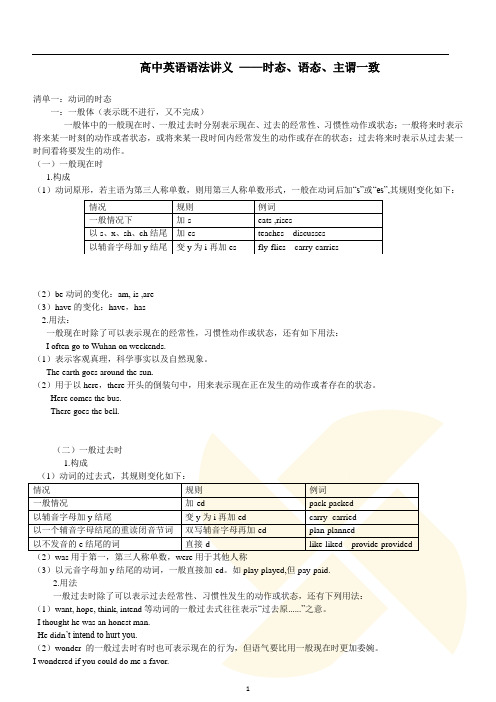
高中英语语法讲义——时态、语态、主谓一致清单一:动词的时态一:一般体(表示既不进行,又不完成)一般体中的一般现在时、一般过去时分别表示现在、过去的经常性、习惯性动作或状态;一般将来时表示将来某一时刻的动作或者状态,或将来某一段时间内经常发生的动作或存在的状态;过去将来时表示从过去某一时间看将要发生的动作。
(一)一般现在时1.构成(1)动词原形,若主语为第三人称单数,则用第三人称单数形式,一般在动词后加“s”或“es”,其规则变化如下:情况规则例词一般情况下加-s eats ,rises以s、x、sh、ch结尾加-es teaches discusses以辅音字母加y结尾变y为i再加es fly-flies carry-carries(2)be动词的变化:am, is ,are(3)have的变化:have,has2.用法:一般现在时除了可以表示现在的经常性,习惯性动作或状态,还有如下用法:I often go to Wuhan on weekends.(1)表示客观真理,科学事实以及自然现象。
The earth goes around the sun.(2)用于以here,there开头的倒装句中,用来表示现在正在发生的动作或者存在的状态。
Here comes the bus.There goes the bell.(二)一般过去时1.构成情况规则例词一般情况加-ed pack-packed以辅音字母加y结尾变y为i再加ed carry- carried以一个辅音字母结尾的重读闭音节词双写辅音字母再加-ed plan-planned以不发音的e结尾的词直接-d like-liked provide-provided(2)was用于第一,第三人称单数,were用于其他人称(3)以元音字母加y结尾的动词,一般直接加-ed。
如play-played,但pay-paid.2.用法一般过去时除了可以表示过去经常性、习惯性发生的动作或状态,还有下列用法:(1)want, hope, think, intend等动词的一般过去式往往表示“过去原......”之意。
动词的时态及语态 主谓一致
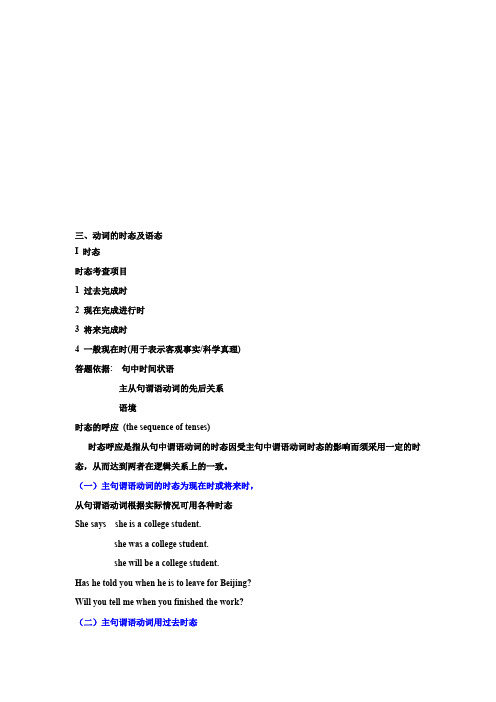
三、动词的时态及语态I 时态时态考查项目1 过去完成时2 现在完成进行时3 将来完成时4 一般现在时(用于表示客观事实/科学真理)答题依据: 句中时间状语主从句谓语动词的先后关系语境时态的呼应(the sequence of tenses)时态呼应是指从句中谓语动词的时态因受主句中谓语动词时态的影响而须采用一定的时态,从而达到两者在逻辑关系上的一致。
(一)主句谓语动词的时态为现在时或将来时,从句谓语动词根据实际情况可用各种时态She says she is a college student.she was a college student.she will be a college student.Has he told you when he is to leave for Beijing?Will you tell me when you finished the work?(二)主句谓语动词用过去时态1 若从句谓语动词的动作与主句谓语动词的动作同时发生,从句用一般过去时或过去进行时She told me she was a teacher.He said he was studying English.2 若从句谓语动词的动作发生在主句谓语动词的动作之前,从句用过去完成时或过去完成进行时She explained to me that she had made the mistake chieflyout of carelessness.Betty said that she had been waiting for my call.3 若从句谓语动词的动作发生在主句谓语动词的动作之后,从句用过去将来时、过去将来进行时或过去将来完成时。
He said that he would come back the next day.She said that she would be setting off on the 10 o’clock train.He told them that he would have finished by six o’clock.4 若从句谓语动词的动作发生在主句谓语动词的动作之前,但从句中有表示某一具体时间的状语,从句用一般过去时。
高中英语知识点归纳虚拟语气的构成与应用

高中英语知识点归纳虚拟语气的构成与应用虚拟语气是英语语法中的一个重要概念,用来表达与事实相反、虚构或假设的情况。
学好虚拟语气的构成和应用是高中英语学习中的关键之一。
本文将对虚拟语气的构成及其常见应用进行归纳总结,以帮助同学们更好地掌握这一知识点。
一、虚拟语气的构成1. 虚拟语气的基本形式虚拟语气的基本形式是由动词的原形构成。
在if条件从句中、一些特殊的固定结构和特殊的动词后面所引导的宾语从句、表语从句、同位语从句中常常使用虚拟语气。
例如:If I were you, I would study harder.(如果我是你,我会更加努力学习。
)It's time that we went to bed.(是我们该睡觉的时候了。
)She demanded that he apologize to her.(她要求他向她道歉。
)2. 虚拟语气的时态虚拟语气并没有自己的时态,通常与过去的时态相呼应。
即主句使用过去时态,虚拟语气中的动词使用过去完成时。
例如:If I had known it earlier, I would have told you.(如果我早知道,我会告诉你的。
)3. 虚拟语气的主谓一致在虚拟语气中,主从句的谓语动词要求保持一致。
即主句中虚拟语气的谓语动词为虚拟语气形式,从句中谓语动词按照实际情况使用。
例如:He suggested that I go to the party.(他建议我去参加聚会。
)They insisted that he apologize to them.(他们坚持要求他向他们道歉。
)二、虚拟语气的应用1. 表达与事实相反的虚拟条件虚拟语气常用于表示与事实相反的条件语句。
如果与过去事实相反,从句的谓语动词使用过去完成时。
例如:If I were you, I would buy a new car.(如果我是你,我会买一辆新车。
)2. 表达虚拟愿望与建议虚拟语气还可以用于表达愿望、建议等含义。
主谓一致、强调句和倒装句、情态动词和虚拟语气讲解以及习题详细解析
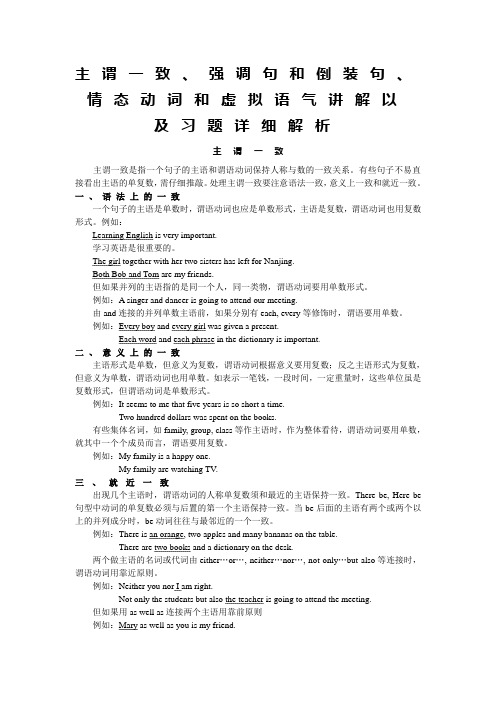
主谓一致、强调句和倒装句、情态动词和虚拟语气讲解以及习题详细解析主谓一致主谓一致是指一个句子的主语和谓语动词保持人称与数的一致关系。
有些句子不易直接看出主语的单复数,需仔细推敲。
处理主谓一致要注意语法一致,意义上一致和就近一致。
一、语法上的一致一个句子的主语是单数时,谓语动词也应是单数形式,主语是复数,谓语动词也用复数形式。
例如:Learning English is very important.学习英语是很重要的。
The girl together with her two sisters has left for Nanjing.Both Bob and Tom are my friends.但如果并列的主语指的是同一个人,同一类物,谓语动词要用单数形式。
例如:A singer and dancer is going to attend our meeting.由and连接的并列单数主语前,如果分别有each, every等修饰时,谓语要用单数。
例如:Every boy and every girl was given a present.Each word and each phrase in the dictionary is important.二、意义上的一致主语形式是单数,但意义为复数,谓语动词根据意义要用复数;反之主语形式为复数,但意义为单数,谓语动词也用单数。
如表示一笔钱,一段时间,一定重量时,这些单位虽是复数形式,但谓语动词是单数形式。
例如:It seems to me that five years is so short a time.Two hundred dollars was spent on the books.有些集体名词,如family, group, class等作主语时,作为整体看待,谓语动词要用单数,就其中一个个成员而言,谓语要用复数。
例如:My family is a happy one.My family are watching TV.三、就近一致出现几个主语时,谓语动词的人称单复数须和最近的主语保持一致。
2024年高考真题和模拟题英语分类汇编:专题02 动词的时态、语态、情态动词、虚拟语气(解析版)
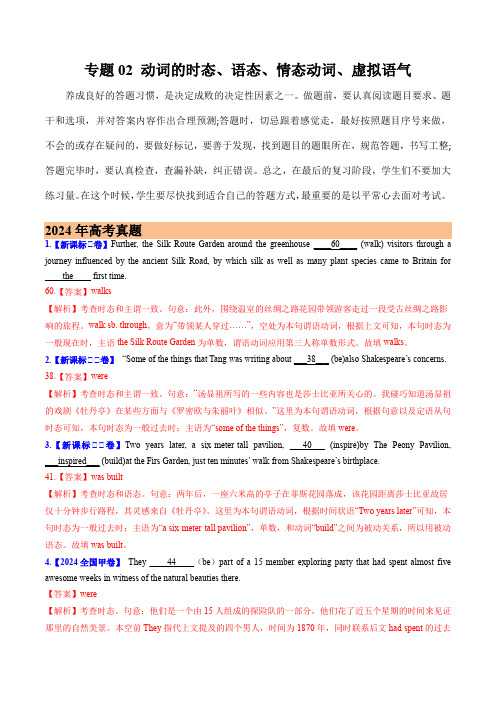
专题02 动词的时态、语态、情态动词、虚拟语气养成良好的答题习惯,是决定成败的决定性因素之一。
做题前,要认真阅读题目要求、题干和选项,并对答案内容作出合理预测;答题时,切忌跟着感觉走,最好按照题目序号来做,不会的或存在疑问的,要做好标记,要善于发现,找到题目的题眼所在,规范答题,书写工整;答题完毕时,要认真检查,查漏补缺,纠正错误。
总之,在最后的复习阶段,学生们不要加大练习量。
在这个时候,学生要尽快找到适合自己的答题方式,最重要的是以平常心去面对考试。
2024年高考真题1.【新课标Ⅰ卷】Further, the Silk Route Garden around the greenhouse ____60____ (walk) visitors through a journey influenced by the ancient Silk Road, by which silk as well as many plant species came to Britain for ____the____ first time.60.【答案】walks【解析】考查时态和主谓一致。
句意:此外,围绕温室的丝绸之路花园带领游客走过一段受古丝绸之路影响的旅程。
walk sb. through,意为“带领某人穿过……”,空处为本句谓语动词,根据上文可知,本句时态为一般现在时,主语the Silk Route Garden为单数,谓语动词应用第三人称单数形式。
故填walks。
2.【新课标ⅠⅠ卷】“Some of the things that Tang was writing about ___38___ (be)also Shakespeare’s concerns.38.【答案】were【解析】考查时态和主谓一致。
句意:“汤显祖所写的一些内容也是莎士比亚所关心的。
我碰巧知道汤显祖的戏剧《牡丹亭》在某些方面与《罗密欧与朱丽叶》相似。
高中英语 动词的时态、语态和主谓一致精讲
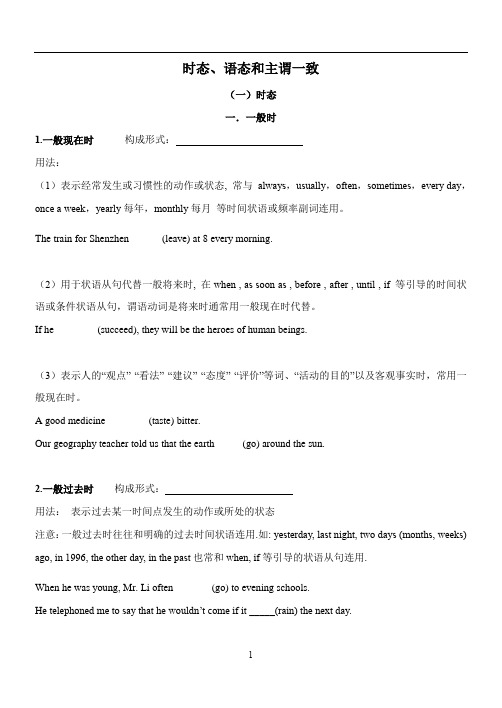
时态、语态和主谓一致(一)时态一.一般时1.一般现在时构成形式:用法:(1)表示经常发生或习惯性的动作或状态, 常与always,usually,often,sometimes,every day,once a week,yearly每年,monthly每月等时间状语或频率副词连用。
The train for Shenzhen ______(leave) at 8 every morning.(2)用于状语从句代替一般将来时, 在when , as soon as , before , after , until , if 等引导的时间状语或条件状语从句,谓语动词是将来时通常用一般现在时代替。
If he ________(succeed), they will be the heroes of human beings.(3)表示人的“观点” “看法” “建议” “态度” “评价”等词、“活动的目的”以及客观事实时,常用一般现在时。
A good medicine ________(taste) bitter.Our geography teacher told us that the earth _____(go) around the sun.2.一般过去时构成形式:用法:表示过去某一时间点发生的动作或所处的状态注意:一般过去时往往和明确的过去时间状语连用.如: yesterday, last night, two days (months, weeks) ago, in 1996, the other day, in the past也常和when, if等引导的状语从句连用.When he was young, Mr. Li often _______(go) to evening schools.He telephoned me to say that he wouldn’t come if it _____(rain) the next day.3.一般将来时构成形式:用法:表示将要发生的动作或存在的状态。
第三节 主谓一致与时态、语态

第三节主谓一致与时态、语态谓语动词指在句子中充当谓语的动词。
而谓语成分就是用来说明主语的动作或状态的。
实义动词可以独立充当谓语动词;连系动词必须和表语一起充当谓语动词;助动词、情态动词不能单独作谓语,只能协助主要动词一起构成谓语动词。
在中学英语教学中,学生最难掌握的语法项目是什么?学生70%以上的错误都出在了谓语动词变化的环节。
首先,英语句子的谓语会随着句子时态的变化而变化,而在汉语中,动词永远不会有时间上的变化,如果要表现时态,也仅仅就在句子中加入“现在”“刚才”之类的时间词就可以了。
再次,英语谓语动词的变化往往要随着句子主语的变化而变化,而汉语中谓语动词是不会随着主语的变化而变化的,无论主语是单数,复数概念,还是第一、第二、第三人称。
第三,汉语句子的肯定句、疑问句、否定句变化简单。
而英语句子必须通过谓语动词的变化,才能变成肯定句、疑问句、否定句。
最后,英语句子的主动语态和被动语态的变化,也要通过谓语动词变化来实现。
而汉语只需要使用“被”字就可以。
总之,任何一个句子中的谓语动词,都包含着主谓一致、时态、语态、语气等这几方面变化的信息。
写出或者说出任何一个英语句子,都要考虑这几个方面的情况。
稍有不慎,就会出现错误。
掌握了谓语动词的变化规则,就意味着突破了英语语法学习的瓶颈。
一、主谓一致主谓一致是指:(1)语法形式上要一致,即主语单复数与谓语的单复数形式要一致。
(2)意义上要一致,即主语意义上的单复数要与谓语的单复数形式一致。
(3)就近原则,即谓语动二、时态时是时间,即谓语动词发生的时间可分为现在、过去、将来和过去将来等四种时间形式;态是形态,即谓语动词发生的方式,可分为一般、进行、完成和完成进行等四种形式。
高中三、语态语态是动词的一种形式,用来说明主语和谓语动词之间的关系。
英语动词有两种语态,即主动语态和被动语态。
主动语态表示主语是谓语动词动作的执行者;被动语态表示主语是谓语动词动作的承受者。
被动语态是动词的一种特殊形式,一般来说,只有需要动作对象的及物动词才有被动语态,不及物动词没有被动语态。
- 1、下载文档前请自行甄别文档内容的完整性,平台不提供额外的编辑、内容补充、找答案等附加服务。
- 2、"仅部分预览"的文档,不可在线预览部分如存在完整性等问题,可反馈申请退款(可完整预览的文档不适用该条件!)。
- 3、如文档侵犯您的权益,请联系客服反馈,我们会尽快为您处理(人工客服工作时间:9:00-18:30)。
A 1. Make sure that you ____ all the windows when you leave the home . A.shut B.will shut C.have shut D.would shut B 2. Edison ____ questions, ____ made his teacher very angry. A.always asked;that B.was always asking;which C.always asks;which D.had always asked;that C 3. The reporter said that the UFO ___ east to west when he saw it. A. was to travel B. had been traveling C. was traveling D. traveled
Eg. This is the most interesting book that I ___(read). We _____(hope) that you would be able to visit us, but you did not. It was the first time that we ____(travel) together. She _____(think) of paying us a visit, but was prevented from doing so.
6. I thought Jim would say something about his C school report, but he ___ it. A. doesn’t mention B. hadn’t mentioned C. didn’t mention D. hasn’t mentioned 7. In such dry weather, the flowers will have to B be watered if they ____. A. had survived B. are to survive C. would survive D. will survive
动词语态
一般 现在
进行
完成
am/is/are asked was/were asked shall/will be asked should/would be asked
过去
am/is/are being asked was/were being asked
have/been asked had been asked shall/will have been asked should/would have been asked
4. 现在完成进行时的用法 结构: 结构: doing,表示现在以前一 have/has been doing,表示现在以前一 直在进行的动作。 直在进行的动作。如: 已写完 I have written a letter. I have been writing a letter. 还在写 注意: 注意:短暂动词 (finish,marry,get up,come,go等 不能用这种时态。 up,come,go等)不能用这种时态。
现在/ 3. 现在/过去完成时的用法 (1)在 (1)在“It/This is the best/worst/most interesting+名词 that…”中 名词+ interesting+名词+that…”中,从句用现 在完成时。 在完成时。 (2)在 that…”中 (2)在“It/This is the first/last time that…”中, 从句用现在完成时。 从句用现在完成时。 (3)在 (3)在“It was the first time that sb. had done” 主句一般过去时,that引导的从句 中,主句一般过去时,that引导的从句 用过去完成时。 用过去完成时。 (4)hope,wish,expect,think,intend,mean=intend, (4)hope,wish,expect,think,intend,mean=intend, suppose等的过去完成时的含义指 等的过去完成时的含义指“ suppose等的过去完成时的含义指“过 去没有实现的愿望、计划” 去没有实现的愿望、计划”。含失望 的感情色彩。 的感情色彩。
2. 现在进行时的用法 现在进行时与always, 现在进行时与always, continually, forever等频度副词连用 等频度副词连用, constantly, forever等频度副词连用, 表示赞叹、厌烦等感情色彩。 表示赞叹、厌烦等感情色彩。 eg. They ___ forever ___(quarrel) about something.
D. is sold
4. In recent years travel companies have succeeded in selling us the idea that the further C we go, _____. A. our holiday will be better B. our holiday will be the better C. the better our holiday will be D. the better will our holiday be 5. ---How are you today? D ---Oh, I ___ as ill as I do now for a very long time. A. didn’t feel B. wasn’t feeling C. don’t feel D. haven’t felt
(5)用在“ sooner…than”和 (5)用在“no sooner…than”和 用在 hardly/scarcely…when”( “hardly/scarcely…when”(一 …就…) 从句用一般过去时。 中,从句用一般过去时。 sooner/hardly/scarcely放句首 放句首, no sooner/hardly/scarcely放句首,要倒装 eg. We had no sooner reached home than it began to rain. We had hardly reached home when it began to rain. 他一进办公室,电话就响了。(倒装) 。(倒装 他一进办公室,电话就响了。(倒装) Hardly had he entered the office when the phone rang.
3.用非谓语的主动表示被动 3.用非谓语的主动表示被动 require,deserve后用动名词 (1)want,need, require,deserve后用动名词 的主动形式。 的主动形式。如: 学生们需要照料。 学生们需要照料。 The student needs/wants/requires looking after. (2)形容词worth后用动名词主动表示被 形容词worth (2)形容词worth后用动名词主动表示被 动。如: The book is well worth reading.
1. Do let your mother know all the truth. She D appears ____ everything . A.to tell B.to be told C.to be telling D.to have been told
B 2. The new suspension bridge ____ by the end of last month. A. has been designed B. had been designed C.was designed D. would be designed A 3. Books of this kind ____ well. A. sell B. sells C. are sold
不及物动词, 2. 不及物动词,包括不及物动词用的 短语动词, 短语动词,如take place, appear, happen, occur,belong to, return, break of不用被动 不用被动。 out,rise,consist of不用被动。所有的联 系动词, 系动词,如: taste,look,sound,prove,taste,wear不用被 taste,look,sound,prove,taste,wear不用被 动语态 这菜尝起来可口。 这菜尝起来可口。 The dish tastes delicious.
完成进行
have/has been doing
would/ have will/shall should been have been have doing doing been doing
1. 一般将来时的用法 (1)will/shall (1)will/shall + 动词原形 (2)be 不定式, (2)be going to + 不定式,表示打算准备要 做的事或肯定要发生的事。 做的事或肯定要发生的事。Eg. How are you going to spend your holiday? (3)be +不定式 不定式, (3)be about to +不定式,表示即将发生的 动作。 动作。 (4)be +不定式 不定式, (4)be to +不定式,表示计划中的义务要 做的事,含有“不得不”强制意义。 做的事,含有“不得不”强制意义。 Eg. The president of America is to visit China next month.
将来
过去 将来
1.say,believe,report,announce,suppose,know, 1.say,believe,report,announce,suppose,know, consider,hope等以it作形式主语时用 等以it consider,hope等以it作形式主语时用 被动语态,后接that从句。 that从句 被动语态,后接that从句。如: 据说我们足球队赢得了比赛。 据说我们足球队赢得了比赛。 It is said that our football team has won the game.= Our football team is said to have won the game.
